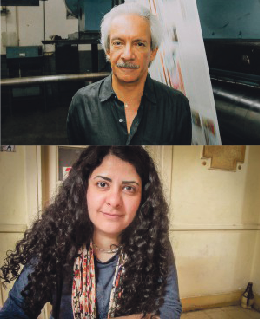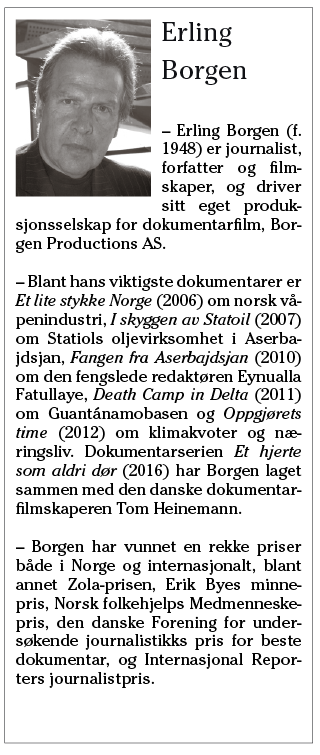(THIS ARTICLE IS MACHINE TRANSLATED by Google from Norwegian)
A Heart That Never Dies (6 Movies)
Directed by Erling Borgen
It's easy to forget that change always begins somewhere, with one man or one woman. A revolution, or a fundamental change in the structure of society, is not something that begins with many, it does not begin with agreement. As a rule, it begins with a person who decides to tell a different story, to make a different perspective visible than the usual. Then the ka associates
Appreciate this one more, to stand stronger with their perspective.
It is such individuals that we get portraits of in the gripping and important documentary film series A heart that never dies, which highlights people who oppose oppression, abuse, and slander of freedom of speech.
Reminder. Such dissidents are needed, and we need to recalls that they are needed. We need to remember that they exist, too – both because they shed light on corrupt regimes in the world – but also because they give hope, and because they testify that it is possible to do anything, even in difficult conditions.
Take José Rubén Zamora, for example. He owns the newspaper El Periódico in Guatemala, a country ruled by a, according to Zamora, "kleptocratic elite". "They are just concerned about getting rich as fast as possible," he says. It is both gripping and frightening to hear the story of Zamora. The newspaper he runs reveals – without censorship – the corrupt regime Guatemalans live under, which is of course not popular with them at the top. He has been harassed several times, and in one case he and his family were visited by the government's special forces, who pretended to kill both him and his immediate family. He was told to "stop bothering them up there" – and the threat that "you do it again, we'll kill you and the family."
He was allowed to live this time and is still alive, but it is unclear how things will go with him. If threats are sufficient, and the harassment is frequent and severe enough, even the most vaunted grave journalist and human rights activist will bend his neck and keep his mouth shut. But Zamora doesn't. The children are sent out of the country – to Canada and the United States – while the father and mother fight for the old country.
In another of the films we meet Brankica Stankovic, who is making a Serbian documentary program called Insider, and suffering the same fate.
Corruption. One of the strongest contributions in A heart that never dies tells about lawyer Rizwana Hasan from Bangladesh. She is fighting for environmental improvement in the extremely polluted capital of Dhaka.
But she doesn't stop there. In the areas around Dhaka, more and more areas owned by poor farmers are beginning to be occupied by private companies' factories – completely without law. Since the government benefits from both employment and industry like this, politicians often look a different way. The farmers, who rarely have the means to hire legal aid, get a bit of a defender in Hasan. She also assists the very poor who work for just under one dollar a day under dangerous circumstances. But as is the case for Zamora and Stankovic, such broad activism does not come without the danger to life and health. Like the journalists mentioned, Hasan's family is constantly at risk – in fact, her husband was abducted by someone who most likely represented the companies that occupied the farmers' properties. He recovered, thanks to much media attention and finally a direct government intervention. But how long will it last?
 Threats. In another film, we get to know human rights activist Ales Bialiatski. He has been in prison for three years because of his human rights work. In 1996, Bialiatski founded Viasna, a center for human rights in Minsk. "It came to an end after increasing pressure on civil society in Belarus. This was early under Lukashenko's rule. We were subjected to extensive repression. We had to try to protect ourselves as best we could, ”says Bialiatski. Eventually, the state closed Viasna's offices and confiscated everything they had. When Bialiatski comes to prison again, or whether his family will face threats and reprisals, is in the blue. In principle, anything can happen at any time
Threats. In another film, we get to know human rights activist Ales Bialiatski. He has been in prison for three years because of his human rights work. In 1996, Bialiatski founded Viasna, a center for human rights in Minsk. "It came to an end after increasing pressure on civil society in Belarus. This was early under Lukashenko's rule. We were subjected to extensive repression. We had to try to protect ourselves as best we could, ”says Bialiatski. Eventually, the state closed Viasna's offices and confiscated everything they had. When Bialiatski comes to prison again, or whether his family will face threats and reprisals, is in the blue. In principle, anything can happen at any time
As in Guatemala and Bangladesh, writers and intellectuals often end up in prison if they speak against the regime. Again, the personal cost is enormous: When Bialiatski came out of prison in 2014, many of his friends wanted him to give up work – "now it will be enough," they said. But he refused to put down activism.
Thread Rape. The most impressive episode is about the musician Yasmine El Baramawy, who was raped during the Arab Spring during a demonstration at Tahrir Square in 2012. The incident was extra ugly because it all happened on the open street and was exceptionally violent. Shameful as she was, she would not tell anyone about what had happened, not even the family. But when she learned that this was something that happened to several women during later demonstrations, she felt obliged to take the blade from her mouth. She appeared under the full name of Egyptian television and told of what had happened, completely without a filter. She brought with her the clothes she had worn during the rape and showed them off live, agitated and full of blood.
What is special is that when this happened, there was in fact no functioning law or proper legal language for this type of abuse in Egypt. This is changing now, because of El Baramawy. But also have an updated lives in danger. Egypt is a society where not everyone has a sense of a woman standing in this way. But had it not happened, the abuse would continue in the hidden. Some had to stand up.
 More identities. El Baramawy also clarifies another, more general human aspect of being a vulnerable person. For even though all individuals who are oppressed or subjected to cruel actions are characterized by this situation, they as human beings are more than just that. "I'm not just one who was raped, I'm also a musician," she says.
More identities. El Baramawy also clarifies another, more general human aspect of being a vulnerable person. For even though all individuals who are oppressed or subjected to cruel actions are characterized by this situation, they as human beings are more than just that. "I'm not just one who was raped, I'm also a musician," she says.
Her point is important because it highlights the lamentable tendency we have to identify individuals with one particular trait if it is clear enough. As the Indian economist and philosopher Amartya Sen points out Violence and Identity it is this narrowing in others' eyes of the individual that makes it difficult to establish the individual's real ability to develop the ability to act, think and feel in line with his interests and talents – his "capabilities", which he (along with Martha Nussbaum ) call it.
“In our everyday lives, we see ourselves as members of a wide range of different groups – and we belong to everyone. One person can be both a US citizen, of Caribbean origin, with African ancestry, Christian, liberals and so on, without these things being in any contradiction to each other. All these different groups that one person belongs to at the same time contribute to giving the person their specific identity, ”Sen. writes.
The perpetrator's perspective. When the state does nothing, or when the state might self is the abuser, the civilian population must step in.
It could nevertheless be interesting to see the authorities 'response to the dissidents' speech. Not because they have points that will convince us – they obviously do not – but because it would nuance the picture and give us an insight into how lies and denial are put into system. Such a supplement would also give us a perspective on another side of the story, namely how state representatives fabricate alternative versions of reality, and perhaps try to blackmail those who tell a different story than the official one. Such an addition could have been both interesting and probably located the speech of the various dissidents within the space where the language of oppression usually maintains its distorted reality.
But this omission does not weaken A heart that never dies as it is. This is an outstanding documentary series about dissidents – individuals who act when no one else does.
kjetilroed@gmail.com


